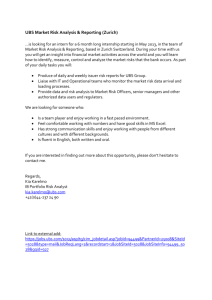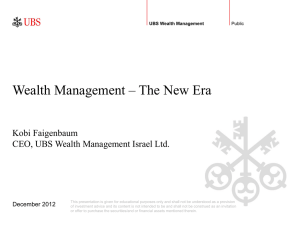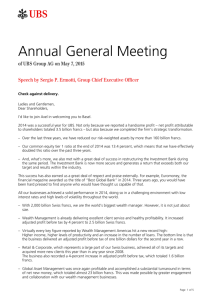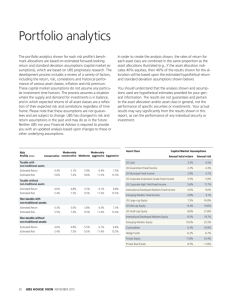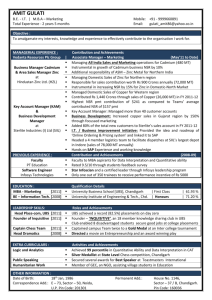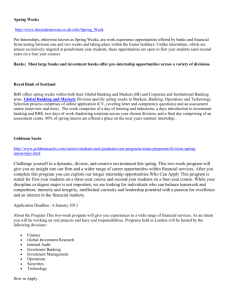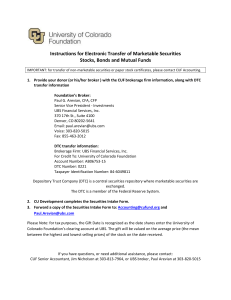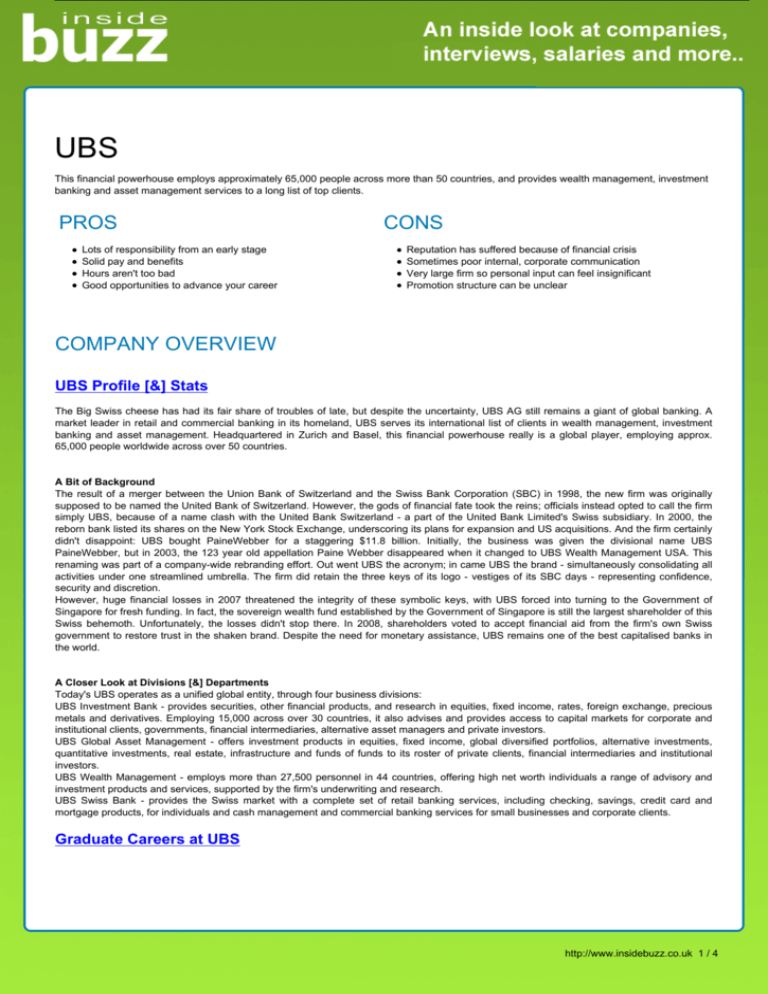
UBS
This financial powerhouse employs approximately 65,000 people across more than 50 countries, and provides wealth management, investment
banking and asset management services to a long list of top clients.
PROS
Lots of responsibility from an early stage
Solid pay and benefits
Hours aren't too bad
Good opportunities to advance your career
CONS
Reputation has suffered because of financial crisis
Sometimes poor internal, corporate communication
Very large firm so personal input can feel insignificant
Promotion structure can be unclear
COMPANY OVERVIEW
UBS Profile [&] Stats
The Big Swiss cheese has had its fair share of troubles of late, but despite the uncertainty, UBS AG still remains a giant of global banking. A
market leader in retail and commercial banking in its homeland, UBS serves its international list of clients in wealth management, investment
banking and asset management. Headquartered in Zurich and Basel, this financial powerhouse really is a global player, employing approx.
65,000 people worldwide across over 50 countries.
A Bit of Background
The result of a merger between the Union Bank of Switzerland and the Swiss Bank Corporation (SBC) in 1998, the new firm was originally
supposed to be named the United Bank of Switzerland. However, the gods of financial fate took the reins; officials instead opted to call the firm
simply UBS, because of a name clash with the United Bank Switzerland - a part of the United Bank Limited's Swiss subsidiary. In 2000, the
reborn bank listed its shares on the New York Stock Exchange, underscoring its plans for expansion and US acquisitions. And the firm certainly
didn't disappoint: UBS bought PaineWebber for a staggering $11.8 billion. Initially, the business was given the divisional name UBS
PaineWebber, but in 2003, the 123 year old appellation Paine Webber disappeared when it changed to UBS Wealth Management USA. This
renaming was part of a company-wide rebranding effort. Out went UBS the acronym; in came UBS the brand - simultaneously consolidating all
activities under one streamlined umbrella. The firm did retain the three keys of its logo - vestiges of its SBC days - representing confidence,
security and discretion.
However, huge financial losses in 2007 threatened the integrity of these symbolic keys, with UBS forced into turning to the Government of
Singapore for fresh funding. In fact, the sovereign wealth fund established by the Government of Singapore is still the largest shareholder of this
Swiss behemoth. Unfortunately, the losses didn't stop there. In 2008, shareholders voted to accept financial aid from the firm's own Swiss
government to restore trust in the shaken brand. Despite the need for monetary assistance, UBS remains one of the best capitalised banks in
the world.
A Closer Look at Divisions [&] Departments
Today's UBS operates as a unified global entity, through four business divisions:
UBS Investment Bank - provides securities, other financial products, and research in equities, fixed income, rates, foreign exchange, precious
metals and derivatives. Employing 15,000 across over 30 countries, it also advises and provides access to capital markets for corporate and
institutional clients, governments, financial intermediaries, alternative asset managers and private investors.
UBS Global Asset Management - offers investment products in equities, fixed income, global diversified portfolios, alternative investments,
quantitative investments, real estate, infrastructure and funds of funds to its roster of private clients, financial intermediaries and institutional
investors.
UBS Wealth Management - employs more than 27,500 personnel in 44 countries, offering high net worth individuals a range of advisory and
investment products and services, supported by the firm's underwriting and research.
UBS Swiss Bank - provides the Swiss market with a complete set of retail banking services, including checking, savings, credit card and
mortgage products, for individuals and cash management and commercial banking services for small businesses and corporate clients.
Graduate Careers at UBS
http://www.insidebuzz.co.uk 1 / 4
UBS actively recruits from the top universities throughout Europe, taking on graduates as analysts and MBAs as associates. Undergrads can
also apply for various internships, but landing a job at UBS is no walk in the park and entry requirements are tough for all applicants. The firm is
after candidates who can demonstrate excellence in the core competences needed to make it in investment banking.
This sounds rather intimidating so let's try and get some of the myths out the way: Do you need to be an expert in all things financial? No, but
you must be very commercially aware and have proven knowledge of and interest in the investment banking industry and UBS in particular. Do
you need to be analytically sharp and keen on solving heavy problems? Definitely! The firm is after people who possess a logical approach to
work and it's important you come across as such. Do your leadership qualities have to outweigh your teamwork abilities? Not, really. UBS wants
people who are both good leaders and communicative team players. Being interpersonal and sociable is a must!
What about all this talk on being innovative and creative? Well, investment banking is not as conformist as you may think and the firm is
genuinely keen to hire those who are adventurous enough to come up with new ideas and approaches. How organised do you need to be? The
answer is, very! In fact you do not only need to convince with managerial aptitude and initiative, but also with sound decision-making skills.
Above all though, you need to be driven and committed to your career choice and have the intellectual aptitude UBS is after. Strong academic
credentials are as always a given so make sure you keep up with the grades.
The Hiring Process
With European recruitment broken into three geographical areas - the UK and Ireland, Switzerland, and continental Europe - the process differs,
but usually begins with the now seemingly ubiquitous online application. After submitting the online application form, you will have to pass an
online numerical test, which will be timed and includes around 25 to 30 questions testing your logical ability. Wow at this stage and further tests,
interviews and an assessment centre lie in wait.
However, first up is an initial interview that will primarily be competency-based. Make sure you come prepared with a multitude of examples
showing off your teamwork, communication skills, motivation and so on. Questions could include anything from 'Why should we select you?',
'What are your strengths?' to 'How is UBS different from other banks?'. Interviews tend to be informal, with the emphasis placed on finding
individuals that will fit with the UBS culture. Also expect to face another numerical test, which is likely to consist of 40 questions for which you
will have around 35 minutes.
If you've done your homework for round one, you'll be back for round two, an assessment centre consisting of another numerical reasoning test,
a presentation, a group exercise and of course a further interview. The presentations will be based on a case study and, with a specific question
to answer, you'll have to prepare a 10-minute presentation within 45 minutes. Expect to be criticised and bombarded with questions, but don't
get irritated and make sure you argue constructively and concisely. The group exercise will see you work in a team of 8 or so and have you read
and discuss a business-related scenario. This should take no longer than 20 minutes, which doesn't sound like much, but you'll be closely
watched all along so make sure you interact well with the team. Finally, the second interview will be a bit like the first, with more
competency-based and some technical questions mixed together.
Programmes for Graduates and MBAs
UBS's graduate programmes are available in all four of its business arms - investment banking, global asset management, wealth management
and the corporate centre. Hence you can take your pick and choose from all the business units on offer, which also include equities, risk, HR,
operations, IT and equities. The firm's global asset management department is one of its biggest, providing real estate investment advice to
clients. Graduate schemes invariably last between 18 and 24 months. Each one is broken into modules on financial markets, general business
topics, and UBS products.
For analyst positions, UBS hires grads from all disciplines whereas aspirant associates need to come armed with an MBA. Training usually
takes place in either London or New York and you better get ready for the five to eight weeks of studying that lie ahead with classroom
instruction, case studies, presentations and practical exercises.
Role-specific training will also be provided on the job and you can expect to get a taste of 'real-world' finance with some typical day-to-day and
on-the-job-training. If this sounds a little daunting, don't fret - you'll receive support from your managers or perhaps even be assigned a mentor,
depending on the department.
Once you have completed the UBS graduate scheme you can look forward to good international prospects. The firm has almost 80,000
employees in 50 offices worldwide and as long as you've got the language skills and the perseverance, you should be able to compete for one
of these roles.
Associate and Analyst Internships
Like many large firms, there's no better way to get your foot in the door than through an internship. In fact, many interns at UBS are taken over
as full-time employees if they master the final assessment at the end of the placements so keep on the ball.
The firm offers both analyst and associate internships although you need to be a first or second-year MBA student to qualify for the latter (the
former is typically open to undergrads in their second year). Summer internships last 10 weeks and start with a three-day orientation and
training programme that lines out the basics, giving you an introduction to the firm and preparing you for the internship in general.
Winter internships are also on hand, these are usually of a 12-week duration and - like the summer internships - can be taken up in the firm's
main business areas, which include asset management, finance and investment banking.
Expect to shadow various team members, learning the role as you go before eventually taking on some of the job's responsibilities. Interns are
also given the chance to attend sports days and events, internal training courses and breakfast meetings, with the latter designed to educate
about all areas of UBS business and show the career options available at the firm.
If an industrial placement is more your cup of tea, you should expect to stick with UBS for six to 12 months and have a strong interest in IT, risk,
http://www.insidebuzz.co.uk 2 / 4
derivatives and global asset management. Like internships, industrial placements can be a springboard to a career at UBS, but by no means a
guarantee.
If you're still uncertain about a career in investment banking, you should probably participate in the week-long UBS insight programme that
takes place in the firm's London office in March and April. Should you like what you see and vice versa, you may have the chance to get
fast-tracked into the firm's summer internship.
UBS Graduate Recruitment Info
How to apply: www.ubs.com/graduates
The Stats
Chairman: Kaspar Villiger
No. of employees worldwide: 65,000
No. of locations worldwide: 50+ countries
European Locations
Austria • Belgium • Cyprus • Czech Republic • France • Germany • Greece • Hungary • Ireland • Italy • Luxembourg • Monaco •
Netherlands • Poland • Russia • Spain • Sweden • Switzerland • Turkey • Ukraine • UK
UK Locations
Birmingham • Edinburgh • London • Manchester • Newcastle • Jersey
London Office (Main) (click for Google Maps)
3 Finsbury Avenue
London EC2M 2PP
Tel: +44 (0) 7567 5757
www.ubs.com
Departments [&] Services
Asset management services • Investment banking • Wealth management
http://www.insidebuzz.co.uk 3 / 4
ABOUT INSIDE BUZZ
Inside Buzz allows graduates and job seekers to find out what it's really like to work for the UK's top employers by gathering quotes and reviews
from actual employees. Year-round, we survey employees and ask them for feedback on company culture, interviews, salaries, hours, quality of
work, diversity, training, relations with management and more… This ensures our content is up to date, and is the next best thing to talking to
current employees at specific firms. Inside Buzz differs from other career websites and publications in that our information comes directly from
those in the know (the employees) and that we do not package any of our quotes. We simply present the data collected in a friendly, easy to
browse format, both online and in print. Companies do not pay for inclusion on Inside Buzz. This ensures that the information we publish about a
specific company is impartial.
Questions or comments? Email us: info@insidebuzz.co.uk
This brochure and its contents are copyright © 2010, Inside Buzz, Ltd., all rights reserved. Inside Buzz, "An inside look at companies, interviews,
salaries and more" and all other marks displayed herein are registered and/or common law trademarks of Inside Buzz and/or third parties.
Representations made in this brochure are current as of its publication date. This brochure contains reviews, comments and other content
regarding companies, interviews and salaries submitted by employees of firms. Reviews represent the opinions of employees. Inside Buzz does
not sponsor or endorse any user content and therefore is not liable for any statements, representations or other information contained in such
user content. Further, reference to any company or other information of any third party does not constitute or imply endorsement, sponsorship or
recommendation of or affiliation with, such third party by Inside Buzz.
http://www.insidebuzz.co.uk 4 / 4

